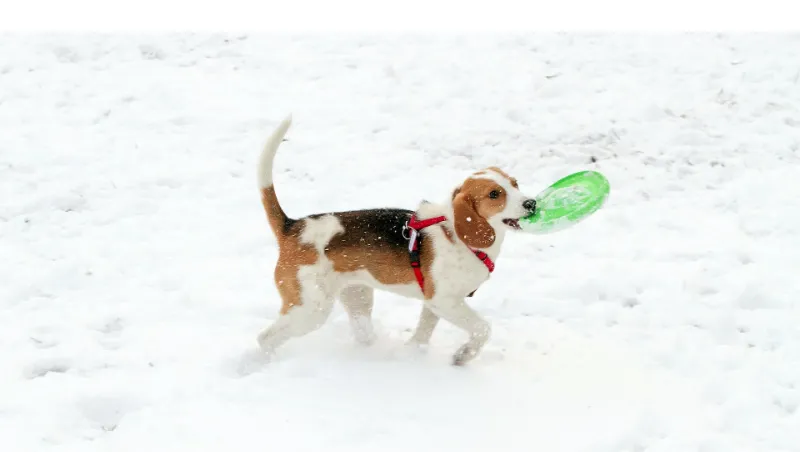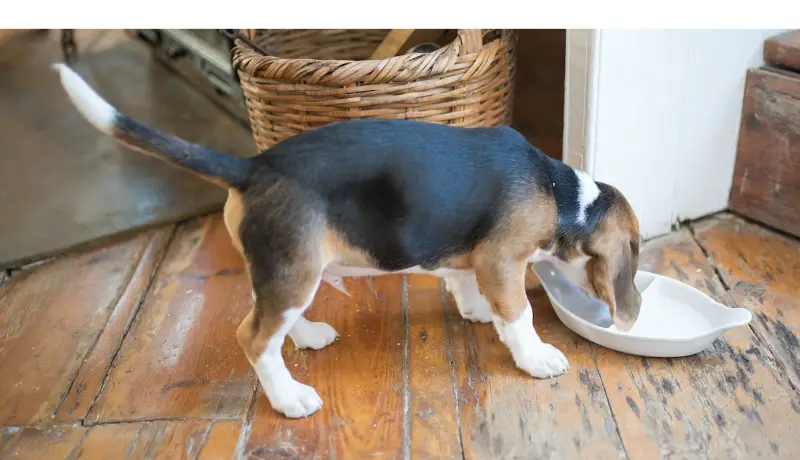Golden retrievers are known for their friendly, loving nature and beautiful golden coats.
As they grow from puppies to adults, they go through a fascinating developmental process, including teething.
But when do golden retrievers stop teething?
In this blog post, we’ll explore the teething timeline for golden retrievers, signs that your puppy is teething, and how you can help soothe their discomfort.
We’ll also touch on preventing destructive chewing habits and when to consult a veterinarian.
Golden Retriever Puppy Growth Stages:
Understanding the different stages of a golden retriever’s growth can help you better anticipate and address their teething needs.
Let’s break down their early life into three key stages:
- Newborn to 3 Weeks Old: During this period, golden retriever puppies are entirely dependent on their mother for nourishment and warmth. They are born without teeth, and their eyes and ears are closed.
- 3 to 8 Weeks Old: In this stage, puppies begin developing baby teeth with their eyes and ears open. They start exploring their surroundings, learning social skills, and playing with their siblings.
- 8 to 16 Weeks Old: This critical period is when golden retriever puppies experience rapid growth and development. They start losing their baby teeth, making way for their adult teeth. Proper socialization and training are crucial during this time.
Teething Timeline for Golden Retrievers:
Teething is essential to a golden retriever puppy’s development, as it marks the transition from baby to adult teeth.
Here’s a quick overview of the teething timeline:
- Baby Teeth Eruption: Golden retriever puppies start growing their baby teeth around 3 to 4 weeks of age. By 6 to 8 weeks old, they should have a full set of 28 baby teeth.
- Adult Teeth Eruption: Between 12 and 16 weeks, puppies begin losing their baby teeth, and adult teeth start to emerge. During this time, you might notice your puppy chewing more than usual.
- When Teething Ends: Most golden retrievers complete their teething process around 6 to 7 months of age. By this time, they should have a full set of 42 adult teeth.
So, how long does teething last in Golden Retriever puppies?
Typically, it lasts around 3 to 4 months, from the emergence of baby teeth to the full set of adult teeth.
Signs Your Golden Retriever Is Teething:
As your golden retriever goes through the teething process, you might notice some telltale signs that indicate they’re experiencing discomfort. Here are a few common symptoms:
- Excessive Chewing: Teething puppies tend to chew on anything they can find to relieve their discomfort, from furniture to shoes.
- Drooling: Increased drooling is common during teething, as the process stimulates saliva production.
- Swollen, Red Gums: Your puppy’s gums may appear swollen and red as adult teeth emerge.
- Bleeding Gums: It’s not unusual for your puppy’s gums to bleed a little during teething, especially when they lose baby teeth.
- Lost Teeth: You may find your puppy’s baby teeth around the house as they fall out.
Remember, monitoring your puppy during this time is essential as providing appropriate chew toys and soothing remedies to help them through the teething process.
How to Soothe Your Teething Puppy:
Offering comfort and support is important as your golden retriever goes through the teething process.
Here are some ways to help alleviate their discomfort:
- Chew Toys: Provide a variety of safe, durable chew toys that are specifically designed for teething puppies. Look for options with different textures to keep your puppy interested and engaged.
- Cold Treats: Chilled treats, like frozen carrot sticks or ice cubes, can help soothe sore gums. You can also purchase puppy-safe frozen treats at pet stores.
- Teething Gels: There are puppy-safe teething gels available, which can help reduce gum inflammation and discomfort. Always consult with your veterinarian before using any teething products.
- Puppy Teething Rings: Puppy teething rings are designed to relieve your puppy’s gums while helping clean their teeth. You can find these at your local pet store or online.
Remember, always supervise your puppy while they’re playing with toys and treats to ensure their safety.
Preventing Destructive Chewing Habits
While chewing is a natural way for golden retriever puppies to cope with teething, preventing destructive habits from forming is essential.
Here are some tips to help guide your puppy’s chewing in a positive direction:
- Establish Boundaries: Teach your puppy which items, like furniture and shoes, are off-limits for chewing. Offer appropriate chew toys as alternatives when they attempt to chew on something they shouldn’t.
- Positive Reinforcement: Praise and reward your puppy when they chew on appropriate toys, reinforcing good behavior.
- Consistent Training: Consistency is crucial in teaching your puppy proper chewing habits. Be patient and maintain clear rules so they understand what’s expected of them.
- Exercise and Mental Stimulation: Keep your puppy physically and mentally engaged with walks, playtime, and puzzle toys. A tired puppy is less likely to engage in destructive chewing.
By addressing your puppy’s teething needs and guiding their behavior, you can help them develop healthy chewing habits that last a lifetime.
When to Consult a Veterinarian
While teething is a natural part of your golden retriever’s growth, there are times when it’s essential to consult a veterinarian. Here are some situations that warrant a visit to the vet:
- Persistent Discomfort: If your puppy seems to be in constant pain despite your efforts to soothe them, it’s a good idea to consult a veterinarian to ensure there are no underlying issues.
- Broken or Chipped Teeth: Damaged teeth can cause significant discomfort for your puppy and may require veterinary intervention.
- Misaligned Teeth: If your puppy’s adult teeth appear to be coming in crooked or misaligned, consult your vet to discuss potential orthodontic solutions.
- Swollen or Infected Gums: Persistent gum inflammation, bleeding, or signs of infection should be addressed by a veterinarian.
Don’t hesitate to reach out to your vet if you’re concerned about your golden retriever’s teething process. They can offer guidance and support to ensure your puppy’s health and well-being.
Conclusion
Teething is a natural and essential part of a golden retriever’s growth and development.
Knowing when golden retrievers stop teething and understanding the teething process can help you better support your puppy through this sometimes challenging stage.
You can help your golden retriever develop healthy chewing habits that last a lifetime by providing appropriate chew toys, soothing remedies, and consistent guidance.
Remember to consult a veterinarian if you have any concerns about your puppy’s teething process to ensure its health and happiness.










